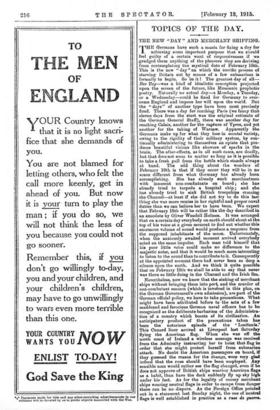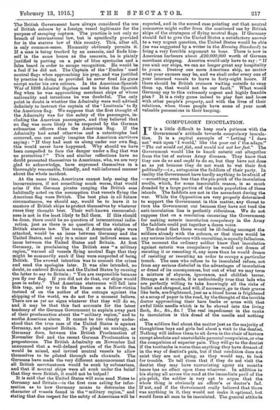TOPICS OF THE DAY.
THE NEW "DAY" AND MERCHANT SHIPPING.
THE Germans have such a mania for fixing a day for JL achieving some important purpose that we should feel guilty of a certain want of responsiveness if we grudged them anything of the pleasure they are deriving from contemplating the mystical date of February 18th. This is the new - day " on which the terrific process of starving Britain out by moans of a few submarines is formally to begin. So be it I The greatest day of all— Der Tag—was a kind of idealistic conception projected upon the screen of the future, like Messianic prophetic poetry. Naturally no actual day—a Monday, a Tuesday, or a Wednesday—could be fixed for Germany to over- come England and impose her will upon the world. But the 4. days" of another type have been most precisely fixed. There was a day for reaching Paris (we fancy that eleven days from the start was the original estimate of the German General Staff), there was another day for reaching Calais, another for the capture of Ypres, and yet another for the taking of Warsaw. Apparently the Germans wake up for what they lose in mental variety, owing to the rigidity of their military system, by con- tinually administering to themselves an opiate that pro- duces beautiful visious like showers of sparks in the brain. The after-effects, as in all such cases, are deadly, but that does not seem to matter so long as it is possible to take a fresh pull from the bottle which stands always at hand. The odd thing about the wonders of February 18th is that if they occur they will he in no sense different from what Germany has already been accomplishing. She has already sunk merchantmen with innocent non-combatants on board ; she has already tried to torpedo a hospital ship ; and she has already tried to sink British troopships crossing the Channel—at least if she did not try to do this last thing she was more remiss in her rightful and proper naval duties than we can believe her to have been. We expect that February 18th will be rather like the day described in an anecdote by Oliver Wendell Holmes. It was arranged that on a certain day everybody on earth should shout at the top of his voice at a given moment to find out whether this enormous volume of sound would produce a response from the supposed inhabitants of the moon. Unfortuna , when the anxiously awaited moment arrived every y acted on the same impulse. Each man told himself that his poor little voice could make no difference to the majestic noise, and that it would be much more interesting to listen to the sound than to contribute to it. Consequently at the appointed moment there had never been so deep silence upon the earth. And we think it quite possible that on February 18th we shall be able to say that never was there so little doing in the Channel and the Irish Sea. Nevertheless, now we know that the sinking of merchant ships without bringing them into port, and the murder of non-combatant seamen (which is involved in this plan, on the German Government's own admission), are part of the German official policy, we have to take precautions. What might have been attributed before to the acts of a few maddened and ferocious German naval officers has to be recognized as the deliberate barbarism of tho Administra- tion of a country which boasts of its civilization. An anticipatory product of the precautions taken has been the notorious episode of the • Lusitania.' This Cunard liner arrived at Liverpool last Saturday flying the American flag. When she was off the north coast of Ireland a wireless message was received from the Admiralty instructing her to hoist that flag in order that she might protect herself from submarine attack. No doubt the American passengers on board, if they guessed the reason for the change, were very glad indeed that the ruse should have been employed. Any sensible man would rather see the flag changed, even if he does not approve of British ships wearing American flags as a habit, than have the deck suddenly fly up sky high under his feet. As for the legality of enemy merchant ships wearing neutral flags in order to escape from danger there can be no dispute. As the Foreign Of pointed out in a statement last Sunday night, the use of neutral- flags is well established in practice as a rase de yams. The British Government have always considered the use of British colours by a foreign vessel legitimate for the purpose of escaping capture. The practice is not only no breach of international law, but is specifically provided for in the statute law of this country. This, after all, is only common-sense. Humanity obviously permits it. If a man is being tracked by an assassin, and finds him- self in the same house as the assassin, he is plainly justified in putting on a pair of blue spectacles and a false beard in order to escape recognition. He would be a fool if he did not. The Captain of the • Emden ' used neutral flag,s when approaching his prey, and was justified by practice in doing so provided he never fired his guns except under his own colours. In the American-Spanish War of 1898 Admiral Sigebee used to hoist the Spanish flag when he was approaching merchant ships of whose nationality and intentions be was doubtful. The only point in doubt is whether the Admiralty were well advised definitely to instruct the captain of the Lusitania ' to fly the American flag. We suppose that the first thought of the Admiralty was for the safety of the passengers, in- cluding the American passengers, and they believed that no flag was more likely to be respected by the German submarine officers than the American flag. if the Admiralty had acted otherwise and a catastrophe had occurred, one can easily imagine the American survivors saying : "If they had sent us along under our own flag, this would never have happened. Why should we have been compelled to face the danger under a flag that was no protection ? " This and similar reflections have no doubt presented themselves to Americana, who, we are very glad to acknowledge, have expressed themselves in a thoroughly reasonable, friendly, and well-informed manner about the whole incident.
At the same time, Americans cannot help seeing the inconvenience, if not something much worse, that would arise if the German pirates ranging the British seas habitually acted on the assumption that vessels flying the American flag were British. The best plan in all future circumstances, we should say, would be to leave it to masters of British ships to protect themselves by whatever ruses they thought best. Their well-known resourceful- ness is not in the least likely to fail them. If this should be done, there could be no question of international india- retion, just as there is no question of the violation of British statute law. The issue, if American ships were attacked, would be an issue between Germany and the United States, and only in a minor and indirect sense an issue between the United States and Britain. At first Germany, in proclaiming the British seas "a military region," warned all vessels flying neutral flags that they might be summarily sunk if they were suspected of being British. The avowed intention was to commit the crime and send the apologies later. It was also intended, no doubt, to embroil Britain and the United States by causing the latter to say to Britain : " You are responsible because you fly our flag. If you did not do that, our ships would pass in safety.' That American statesmen will fall into this trap, and try to fix the blame on a fellow-victim instead of on the author of the outrage against the
shipping of the world, we do not for a moment believe. There are as yet no signs whatever that they will do so, and it may be that this fact accounts for the latest tendency of the German Government to explain away part of their proclamation about the "military region," and to soothe American alarm. It cannot be too clearly under- stood that the true case of the United States is against Germany, not against Britain. To plead an analogy, as Germany does, between the British Proclamation of November 2nd and the recent German Proclamation is preposterous. The British Admiralty on November 2nd announced that a well-defined portion of the North Sea would be mined, and invited neutral vessels to allow themselves to be piloted through safe channels. The
Germane have made the very different announcement that all British merchantmen would be sunk by submarines, and that if neutral ships were all sunk under the belief that they were British, it could not be helped! It is said that the United States will soon send Notes to Germany and Britain—in the first case asking for infor- mation as to how Germany means to determine the character of vessels found in the " military region," and stating that due respect for the safety of Americans will be expected, and in the second case pointing out that neutral commerce might suffer from the continued use by British ships of the stratagem of flying neutral flags. If Germany should fail to give the United States a satisfactory answer to a very urgent question, the United States would be able (as was suggested by a writer in the Evening Standard) to bring a very forcible argument to bear. There is now in American harbours about £20,000,000 worth of German merchant shipping. America would only have to say " If you sink our ships, we can no longer grant any hospitality to yours. Destroy one more American ship, no matter what your excuses may be, and we shall order every one of your interned vessels to leave in forty-eight hours. If there should be British cruisers waiting outside to ens them up, that would not be our fault." What would Germany say to this extremely cogent and highly feasible plan ? It is a risky game indeed to play fast and loose with other people's property, and with the lives of their relations, when those people have some of your most valuable possessions in their keeping.







































 Previous page
Previous page